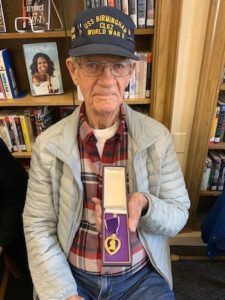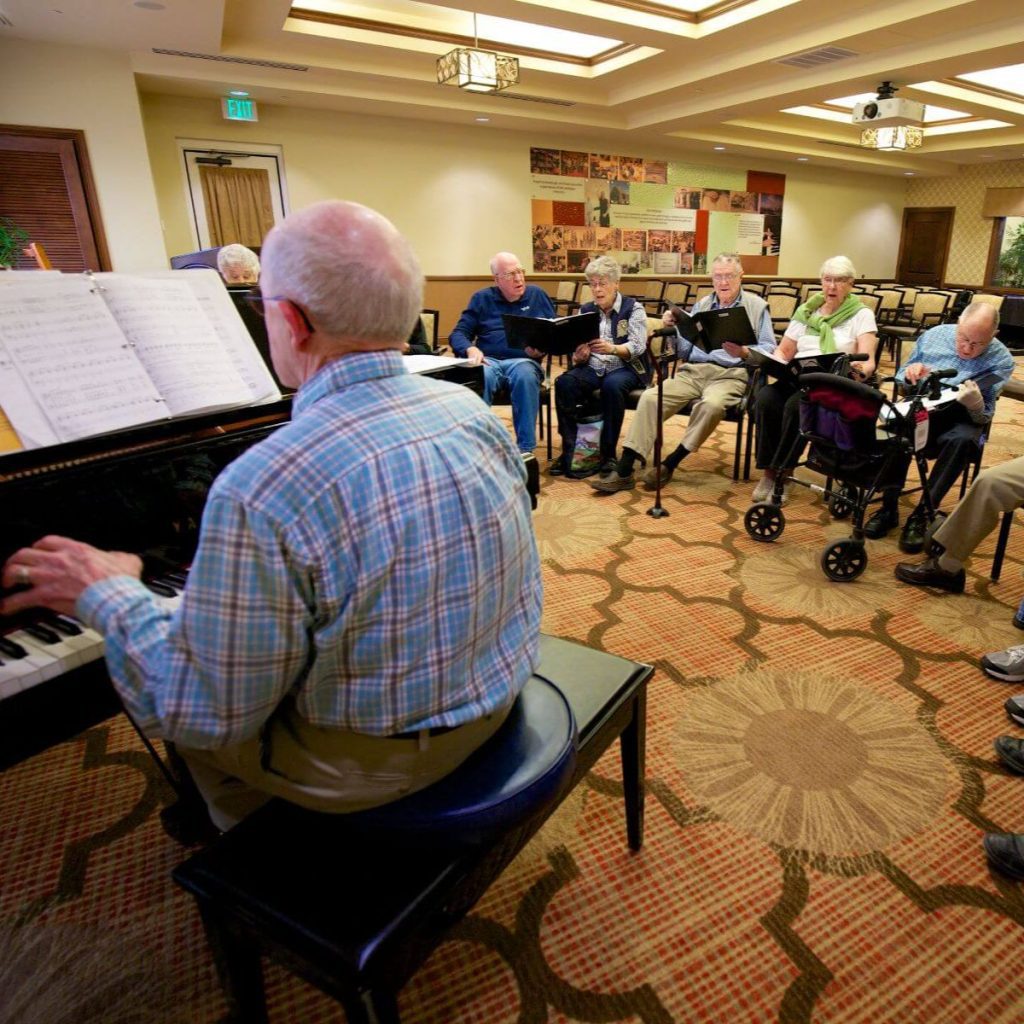Clermont Park Residents & Veterans Share Perspectives with Denver South High School Students
For the past several years, Clermont Park residents and veterans have visited Denver South High School to take part in their “Living History Lessons” program. Each with their own experiences and perspectives from WWII and the Korean War, the residents speak candidly about life during these wars, answer questions from engaged groups of students, and offer their insights on current conflicts.
Click through the articles below to read residents’ stories and watch news coverage from local news outlets.
Clermont Park residents returned to Denver South High School last month for their “Living History Lessons” program. Each resident had their own experiences and perspectives from WWII – from the South Pacific and Europe, to here in the U.S. They shared stories of their lives during the war, answered questions from an engaged group of students, and offered their insights on the war in Ukraine.
Among the audience were journalists from local news stations who shared the residents’ stories and the impact of the South High School’s “Living History Lessons” program on its students. Watch CBS4’s broadcast below, or tune in to the coverage from 9News here.
It’s not every day that you get a personal, first-hand connection with the past. But that’s exactly what the aptly-named “Living History Lessons” have provided over the last eight years. Every spring, residents from Clermont Park Life Plan Community, including WWII and Korean War veterans and their civilian counterparts, visit Denver South High School. Together, they share with all the sophomore social studies students about their personal experiences before and during these wars.
Since its inception, more than 20 Clermont Park residents – men and women – have participated in the Living History Lesson program including Herman Moll.
 As in many past years, Herman and his fellow Clermont residents were featured in a Denver Post story showing how the Living History Lessons continue to provide students with direct access to the past. This year however, the program also connected Herman with Arvada resident David Buckingham. The common denominator? Both David and Herman’s fathers served on the USS Birmingham.
As in many past years, Herman and his fellow Clermont residents were featured in a Denver Post story showing how the Living History Lessons continue to provide students with direct access to the past. This year however, the program also connected Herman with Arvada resident David Buckingham. The common denominator? Both David and Herman’s fathers served on the USS Birmingham.
When David read in the Post about Herman and his service on the USS Birmingham, he immediately contacted the Post reporter, who contacted Clermont’s community relations consultant, who contacted Sales and Marketing Director Heather Hennessee. In just a couple days of his call, Heather was able to facilitate a lunch and sit-down meeting so David could connect with Herman and Herman’s daughters Louis and Laurie.
David’s father was a very private man and never shared what he experienced during the war. Even though he only knew Herman through the newspaper article, David hoped connecting with the veteran might provide insight on his father’s experience.
“The only thing I knew about my father’s service on the Birmingham was that he was in the ‘radio shack,’ the communications tower,” said David. “I used to ask my sisters and my cousins about my dad’s wartime experience, but nobody knew anything. He never talked about it.”
 During David’s visit, Herman shared his first-hand experiences on the light cruiser, which provided support to the aircraft carrier USS Princeton at the Battle of Leyte Gulf, the largest naval battle not just in WWII but in history. Herman recalled the events of October 24, the day the Princeton was struck by a single Japanese bomb, the aid the Birmingham provided the crippled carrier and the carnage that ensued.
During David’s visit, Herman shared his first-hand experiences on the light cruiser, which provided support to the aircraft carrier USS Princeton at the Battle of Leyte Gulf, the largest naval battle not just in WWII but in history. Herman recalled the events of October 24, the day the Princeton was struck by a single Japanese bomb, the aid the Birmingham provided the crippled carrier and the carnage that ensued.
The Birmingham pulled alongside the carrier to extinguish fire caused by the bomb. Herman was manning a fire hose when the Princeton’s magazine hold exploded, sending flaming shrapnel onto the Birmingham. Herman was knocked out and awoke under the lifeless bodies of thee crewmates. Herman immediately began treating the wounded and praying over those who could not be saved. The explosion killed more than 240 and wounded 408 on the Birmingham, including Herman, who received a Purple Cross for his service.
“I don’t remember his dad personally, but I could tell David about our experiences on the Birmingham,” said Herman. “I was able to tell him what kind of work his dad did and about the things we saw and did.”
According to David, his time with Herman made a profound impact. “The greatest thing I got out of this meeting was that I now understand what my dad went through in the war. I know something about that part of his life. Meeting Herman was kind of like meeting a part of my dad that I never knew.”
Herman’s take on meeting David? “I’m so glad I could shed some light on his dad’s story – I’m and open book and it felt good to tell him about our ship and our lives.”
Students at South High School got to participate in a living history lesson this month. Veterans from Clermont Park met with the students to answer questions and tell them first-hand what WWII was like. The veterans, in turn, had the opportunity to teach a generation so far removed from the war, that it may not always seem real.
Read more here in The Denver Post.
Students at South High School experienced that rare opportunity on Friday when three WWII vets, a Korean War vet and the wife of a WWII vet all from Clermont Park] took part in a “living history” lesson. “We’re just trying to bring history alive,” said history teacher Kate Jones. For the rest of the story, visit the Channel 7 website.
This year’s Fourth of July, freedom might have had new resonance for Denver high schoolers, thanks to veterans from Clermont Park Life Plan Community. This past spring, students at South High School had the unique opportunity to hear firsthand from several of the few remaining men and women who fought for US freedom in WWII. For many, the experience opened a new window into the freedoms they enjoy and the sacrifices that made them possible. Students’ gratitude came pouring—quite literally—in the form of 60 thank you notes recently delivered to the community.
“What you did for the country and the world as a whole cannot be overlooked,” one student wrote. “Without the lessons learned and the things that were accomplished through World War II, the world would be a very different place. Where we are today is thanks to you.”
“Although I am familiar with the history behind the war, I was unaware of the tragic experiences many people witnessed during that time,” another shared. “Hearing your story was a good reminder of all that you and other veterans have sacrificed and gone through to defend our country.”
These “living history lessons” are a unique program offered through a partnership between Clermont Park and Denver South High School. Over the past seven years, they have offered numerous students the opportunity to hear from those who have served, including Nick Westendorf, Colorado’s oldest living WWII veteran, who just turned 105 this past month.
Nick Westendorf helped train hundreds of new recruits at Naval Air Station Glenview in Chicago and later served as an airplane mechanic in the Pacific Theater. His stories offer an eye-opening glimpse into life for the many soldiers who served in roles supporting the invasion forces. While Westendorf was able to spend his first years in recruitment closer to home, he was so busy that he actually forgot about his wife’s first pregnancy. He came home one night to find her packing a suitcase, and when he asked why she informed him that she was in labor and headed to the hospital.
When the Navy no longer needed new pilots (and recruitment trainers) for the war effort, Westendorf was shipped overseas to the Philippines. “I signed up for the war,” he explained upon being asked why he continued to serve after his time in recruitment. “I didn’t know how long it would last.” During this second half of WWII service, he recalls the unique experiences of living in a Quonset Hut, docking in a harbor of half-sunken Japanese and American ships and going through the hazing-like “initiation” administered to soldiers crossing the equator for the first time.
His time in the Philippines included more “behind-the-scenes work,” but that doesn’t mean it wasn’t essential. Together with three other airplane mechanics, Westendorf repaired hundreds of P24 aircraft that scouted for Japanese ships. The team of four worked at all hours to make sure that every plane was ready for its next day’s mission.
“We got to be real buddies,” Westendorf recalls, “We had to fix and get every plane back out in perfect condition. One of our planes got shot up badly, but we had it ready to go again by the next day. We never lost a single one.”
It wasn’t until six or eight months in his role as a mechanic that Westendorf recalls “a guy came around on a jeep while I was on night duty and told me that the war’s over, they dropped the bomb. We didn’t even really understand what “the bomb” meant at that time. It was only later that I found out what it was.”
Westendorf was glad to be able to return to his wife and two children. “I didn’t mind doing my part—my duty,” he assured, “But I was glad to go home.”
Westendorf’s home is now Clermont Park Life Plan Community where he can be near his grown daughter Sandra Righter. Moving into a retirement community hasn’t secluded the now 105-year-old veteran. Rather, it has given him the opportunity to continue to explore, connect and share his years of life and service experience. “As soon as he came here, he said it felt like home,” Sandra shared. It also gave him the ability to continue learning Scripture through readings by different volunteers six days a week and participate in programs like the South High living history lessons, where his important life stories can continue to take new root in the memories of our nation’s next generation.
“I am honored that you came and told us your stories because what you endured should not be forgotten and should be a time that all people know about,” said the note of one student who attended this year’s living history program. And if it’s up to Nick Westendorf, the veterans and the staff at Clermont Park, it’s a time whose life and lessons never will be.
This story originally appeared in the Denver Post’s YourHub and is copyright and used by permission.
Story and photo by Bryn Phinney
Clermont Park WWII veterans brought history to life as they shared their experiences with South High School students in Denver. Our residents were glad to help these students get a glimpse into that part of world history in a way unlike any other.
This unique presentation took place on March 12, 2018.
Clermont Park Life Plan Community visited South High School in Denver. Our veterans who were involved in the war shared their first-hand experiences with students, allowing them to understand history in a new light!
Denver’s Channel 9 was there to capture the day…




